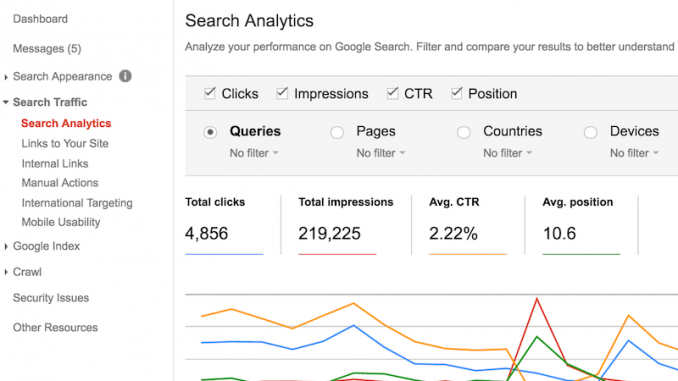
Almost 93% of all online experiences begin with a search engine and 70% of the links that people click are organic.*
Do you need more evidence that SEO is the way to go when it comes to boosting the popularity of your website and your brand? When it comes to inbound marketing, no other technique can deliver the same results.
Writing SEO content is the heart and soul of effective optimization but it’s far from an easy task. Various tools can be used to simplify the process and make it more effective.
If you’re just getting started with SEO content, you’ll find the following 10 tools to be quite useful.
1. Google Search Console
This one is an absolute essential for the execution of your SEO campaign. Google Search Console gives you access to tons of information about the performance of your website, as well as to various tools.
You can learn which pages are delivering the best performance, the keywords that people are using to reach your content and the number of pages that have been indexed already. Based on this information, it will be a whole lot easier to modify the content strategy and make it much more targeted.
2. Google Keyword Planner
Here’s another free option developed by the world’s most prominent search engine.
Google Keyword Planner lets you know which keywords in the respective niche are most popular. You’ll also find out how competitive a particular phrase of interest is. Choosing high volume keywords that aren’t too competitive will form the backbone of a solid SEO strategy.
3. SEMrush
Doing competition analysis is just as important as understanding what optimized texts should feature. Luckily, there are tools you can use for the purpose.
When it comes to competition research, SEMrush is one of your safest bets. You’ll get a detailed domain overview that features the keywords your competitor is ranking well for, whether they’re carrying out a paid search campaign, the number and types of backlinks that they have and the main organic competitors of the respective domain.
4. nTopic
You know what your main topic is and you know what you want to accomplish with your content. Have you managed to complete the task successfully, however? nTopic will let you know.
All that you have to do is enter your domain and a keyword of interest. The tool will run analysis and let you know whether your website’s content is relevant. You’ll get a relevancy score that can be used to do an even better job in terms of focusing your content in the future.
5. Scoop.it
Content curation is imperative for SEO copywriters. Through curation platforms, it becomes easier to go through relevant content, curate ideas and organize all of the data in an effective way.
Scoop.it is currently one of the most popular content curation platforms. You can upload your own curated links or organize the relevant content that others are sharing. Scoop.it has both a free version and a paid plan, depending on how serious you are and what features you need.
6. TopAussieWriters
Feeling a bit insecure about your SEO content writing skills? Professional assistance will come in handy. Topaussiewriters.com is a service that helps you get in touch with some of the best professionals in the field. You can provide information about the project’s specifics and choose the writer that will do the best job.
In this sense, this tool is the only one that doesn’t offer a completely free version. Still, paying for professional content will be a smart idea. You’ll get a high return on investment in the long run, especially if you choose the right person for the job.
7. SpyFu
SpyFu is a smart little tool that can be used to do both competition and keyword research. All that you have to do is enter a keyword or domain of preference.
If you’re doing competition research, SpyFu will let you know which organic keywords the website is ranking for, the estimated monthly SEO click value, the keywords for which the website has made it to the first page of the search engine results and its most prominent competition.
SpyFu can also be used to rank keywords in terms of popularity and competitiveness.
8. Word2Clean
This is a rather basic tool but many SEO writers find it beneficial.
Word2Clean has one very simple purpose – it converts a text file to clean HTML. Whether you’re writing ebooks or you’re uploading blog posts online, having clean HTML to work with is one of the prerequisites for success.
9. Infogr.am
Creating content for SEO purposes isn’t always about text. The best optimization experts know that multimedia and visual content are both incredibly important for the success of the campaign.
If you’ve never made an infographic or a chart in the past, you may worry that it’s too difficult. This is the main reason why you’ll like Infogr.am. The tool makes it easy for people who aren’t graphic designers to put together professional infographics and charts.
10. WooRank
Keeping track of how you’re doing is as important as starting out with a solid plan.
WooRank is one of the best SEO analysis tools out there. Keep in mind, however, that you’re entitled to just one free report per month. If you need to do additional analysis or if you’re writing content for multiple websites, you’ll have to pay for an upgraded plan.
WooRank identifies the strengths and the weaknesses of your SEO campaign. It lets you know whether you’ve managed to rank for keywords of interest, how effective your social media marketing is and if your website has the type of online reputation that you’re hoping for.
Alice Clarke is a content strategist and a passionate writer. She loves hitchhiking and exploring new places for writing catching pieces.
*Source: searchenginejournal.com/24-eye-popping-seo-statistics
Source: ClickZ
Link: 10 useful tools for writing compelling content for SEO



Leave a Reply